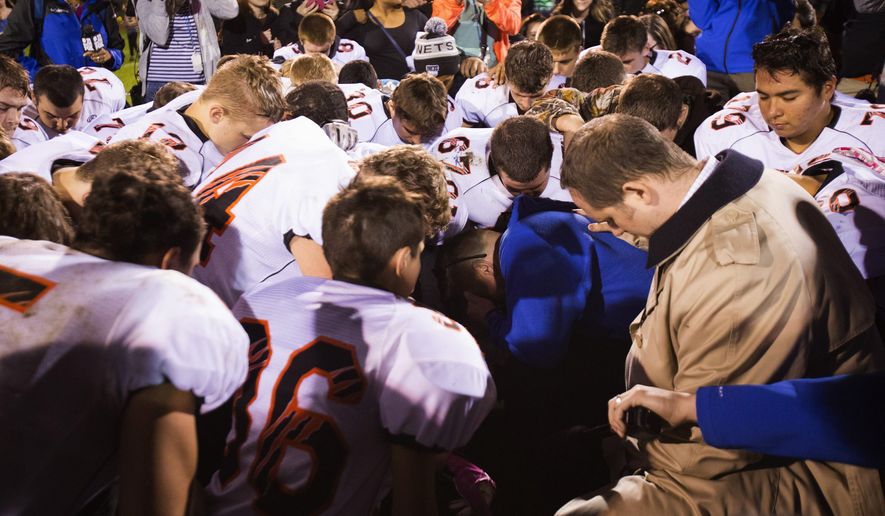In a case that has become a cause celebre for religious liberty advocates, a Washington state high school football coach sanctioned for praying on the playing field after games has filed a federal discrimination suit, a possible precursor to a lawsuit against his school district.
Joseph Kennedy, now on paid administrative leave from his job as assistant football coach at Bremerton School District in Bremerton, Washington, filed a complaint with the Equal Employment Opportunity Commission on Tuesday claiming he suffered workplace retaliation for exercising his right to express his religion.
Filing an EEOC complaint is a “final, mandatory step Coach Kennedy must take before filing a lawsuit against the school district,” said lawyers with Liberty Institute in Plano, Texas, who are defending him.
The EEOC complaint names Aaron Leavell, superintendent of Bremerton School District, as the person responsible for the wrongful action.
The case of the “praying coach” has captured headlines this year because it exposes competing views of what is — and is not — permitted by public school employees when they wish to express their religious beliefs publicly.
Mr. Leavell, backed by the Bremerton School District, sought to discourage Mr. Kennedy from continuing his practice of going to the 50-yard line after football games and praying with gratitude for the safety and well-being of all the players and participants. In recent years, students and other school employees started joining Mr. Kennedy.
However, the postgame prayer appeared to violate the school district’s written policy, which forbids on-duty school employees from engaging in action that is “likely to be perceived as endorsing (or opposing) religion or religious activity,” the school district said this year.
The school district has an obligation “to ensure that the fundamental constitutional rights of all members of the District community are honored,” Mr. Leavell wrote to Mr. Kennedy on Sept. 17.
Both Mr. Kennedy’s 50-yard line postgame prayers and the voluntary pregame locker room prayers he has led “would very likely be found to violate the First Amendment’s Establishment clause, exposing the [school district] to significant risk of liability,” Mr. Leavell wrote.
The school district cited Supreme Court rulings that said schools may not allow prayers to be read — even by students — over a public-address system or at optional, extracurricular events such as football games. The high court also has held that coaches may not lead student prayers or participate or appear to endorse religious activity that is entirely student-related.
Attorneys with the Liberty Institute argued in October that the district was violating both the First Amendment and Civil Rights Act of 1964 by trying to prohibit the coach’s private religious expression.
Neither students nor teachers relinquish their constitutional rights to freedom of speech or expression at the schoolhouse doors, the institute said, citing a 1968 Supreme Court ruling. There is a key difference between “government speech endorsing religion,” which is forbidden, and “private speech endorsing religion,” which is protected, the attorneys wrote.
Moreover, a Buddhist football coach who chants after games on the 50-yard line and other staff members who “engage in visible religious expression” have been permitted to do so without adverse consequences, the EEOC complaint said.
Mike Berry, senior counsel at Liberty Institute, said Tuesday, “All we are asking is for Coach Kennedy to be allowed to pray silently, for 30 seconds, at the 50-yard line after the game. We are committed to defending his rights to private religious expression. No one should be suspended from their job over a moment of silence.”
Patty Glaser, public information officer for Bremerton School District, told The Times that the district had not received official notification of any complaint “so can make no statements at this time.”
• Cheryl Wetzstein can be reached at cwetzstein@washingtontimes.com.




Please read our comment policy before commenting.